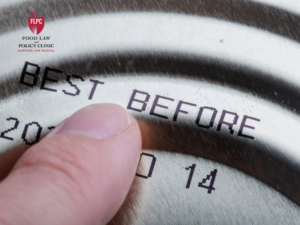By Jevhon Rivers, JD ’17, Harvard Law School
 I spent two weeks in the Navajo Nation as a Continuing Clinical student for the Food Law and Policy Clinic. I had been working on food sovereignty research for a partner in the area during the Fall, but could not comprehend the true depth of the challenges facing the Navajo Nation nor the passion and knowledge of its food advocates until I had the opportunity to visit it myself. During my time there, I was able to see advocates and government representatives working together to solve the complex food issues on the Navajo Nation, while also getting to see the work organizations are already doing, specifically to address chronic illness and increase food access.
I spent two weeks in the Navajo Nation as a Continuing Clinical student for the Food Law and Policy Clinic. I had been working on food sovereignty research for a partner in the area during the Fall, but could not comprehend the true depth of the challenges facing the Navajo Nation nor the passion and knowledge of its food advocates until I had the opportunity to visit it myself. During my time there, I was able to see advocates and government representatives working together to solve the complex food issues on the Navajo Nation, while also getting to see the work organizations are already doing, specifically to address chronic illness and increase food access.
In Window Rock, Arizona, the seat of government for the Navajo Nation Council, I had the opportunity to join a coalition of diverse advocates working toward food sovereignty. Indeed, the Nation seems to be on the precipice of real reform. I attended a committee meeting and a work session of the Health, Education and Human Services Committee (HEHSC) where representatives used the Good Laws, Good Food toolkit, created by FLPC and partners, as a jumping off point. Through these sessions and later meetings with other food advocates and coalition partners, I met key officials that lent insight into the work being done in education, food assistance, and agriculture among others.
During my stay, I was hosted by a partner organization, Community Outreach Patient Empowerment (COPE), a sister organization of Partners in Health (PIH) that works with the Navajo Nation to address chronic illness through education and outreach. Sonlatsa Jim-Martin, the COPE REACH Coalition Coordinator, invited me to participate in a wealth of events and experiences throughout my stay. I was able to get involved in a number of different projects with which COPE is affiliated. I spent one weekend with the Navajo Community Health Outreach (NCHO) Youth Leadership, working with young leaders who serve as public health champions in their communities. Not only did I have the privilege of learning about the role of food in Navajo traditions and culture but I got to witness the variety of public health projects they were creating, such as a campaign to share traditional wisdom on food in local chapter houses.
Later in my stay, I went with the COPE team to a clinic on the opposite end of the reservation to check in with the FVRx program at Monument Valley Clinic. FVRx, or the Fruit and Vegetable Prescription Program, was developed by Wholesome Wave, and enables community healthcare workers to provide health and nutrition counseling coupled with prescriptions for fruits and vegetables that can be redeemed at local stores. Along with store owners and community members, the COPE team planned not only how they would recruit eligible mothers and children, but how they could adjust the education component and vendor partners to best serve their patients. On the way, we stopped at several food vendors as part of COPE’s Healthy Stores Initiative, to give them equipment to facilitate the sale of produce and provide them strategies to make the most of selling healthy food.
 My time in the Navajo Nation not only provided an enriching complement to the research I had completed in the Fall, but gave me greater insight into the inspiring power of food to bring people together in inspiring and unexpected ways.
My time in the Navajo Nation not only provided an enriching complement to the research I had completed in the Fall, but gave me greater insight into the inspiring power of food to bring people together in inspiring and unexpected ways.

Health Law & Policy, Commentary
Cuts to the Federal Workforce and Medicaid: What’s Happening and What Can Advocates Do? – Health Care in Motion
March 12, 2025